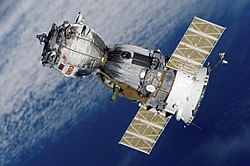 Soyuz MS-15 launches from Site 1/5 at the Baikonur Cosmodrome, marking the final crewed mission from the historic pad where Yuri Gagarin began humanity’s journey into space. | |
| Names | ISS 61S |
|---|---|
| Mission type | ISS crew transport |
| Operator | Roscosmos |
| COSPAR ID | 2019-064A |
| SATCAT no. | 44550 |
| Mission duration | 204 days, 15 hours and 18 minutes |
| Distance travelled | 139,900,000 km (86,900,000 mi) [1] |
| Orbits completed | 3,280 [1] |
| Spacecraft properties | |
| Spacecraft | Soyuz-MS No. 744 |
| Spacecraft type | Soyuz-MS |
| Manufacturer | Energia |
| Crew | |
| Crew size | 3 |
| Members | Oleg Skripochka Jessica Meir |
| Launching | Hazza Al Mansouri |
| Landing | Andrew Morgan |
| Callsign | Sarmat (Сармат) |
| Start of mission | |
| Launch date | 25 September 2019, 13:57:42 UTC [2] [3] |
| Rocket | Soyuz-FG No. Ya15000-071 [4] |
| Launch site | Baikonur, Site 1/5 |
| Contractor | RKTs Progress |
| End of mission | |
| Landing date | 17 April 2020, 05:16:10 UTC |
| Landing site | Steppe of Kazakhstan near the town of Dzhezkazgan ( 47°17′12.6″N69°32′31.2″E / 47.286833°N 69.542000°E ) [3] |
| Orbital parameters | |
| Reference system | Geocentric orbit |
| Regime | Low Earth orbit |
| Perigee altitude | 416 km (258 mi) |
| Apogee altitude | 422 km (262 mi) |
| Inclination | 51.64° [3] |
| Docking with ISS | |
| Docking port | Zvezda aft |
| Docking date | 25 September 2019, 19:42:40 UTC |
| Undocking date | 17 April 2020, 01:53:00 UTC |
| Time docked | 204 days, 6 hours and 10 minutes |
 Mission patch  Launching crew, from left: Al Mansouri, Skripochka and Meir | |
Soyuz MS-15 was a Soyuz spaceflight launched on 25 September 2019, [2] transporting two members of the Expedition 61 crew and a short duration visiting crew member to the International Space Station. Soyuz MS-15 was the 143rd flight of a Soyuz spacecraft with a crew. It was the last flight of Soyuz-FG launcher before its replacement by the Soyuz-2 in the crewed spaceflight role, and also the final launch from Site 1/5 (Gagarin's Start). The crew consisted of a Russian commander, an American flight engineer, and the first Emirati astronaut. [5] [6] To celebrate this event, pictures of the Soyuz launcher and of Hazza Al Mansouri were projected on Burj Khalifa, the tallest building in the world. [7]

